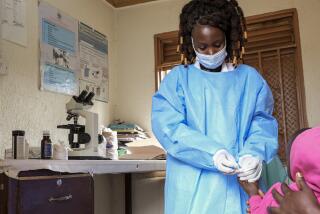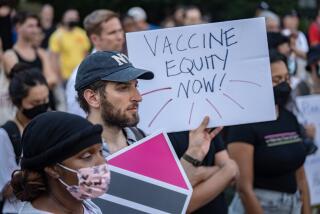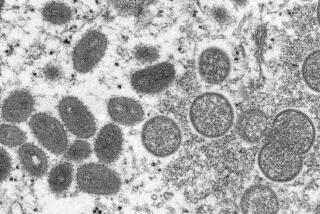WHO OKs use of experimental drugs for Ebola patients in West Africa

The 75-year-old Spanish priest Miguel Pajares was the first European to die in the current Ebola outbreak.
A World Health Organization panel advised Tuesday that it was ethical to use experimental, non-approved drugs to combat the Ebola virus in West Africa, and that five such treatments were being considered for “compassionate use.”
“There was unanimous agreement among the experts,” said Dr. Marie-Paule Kieny, assistant director general of health systems and innovation at the WHO. “It is ethical.”
Although previous outbreaks of Ebola have been contained using traditional methods of quarantine and infection tracking, the latest outbreak is unlike anything that has come before, Kieny said.
With more than 1,000 deaths so far, the United Nations health agency said, the situation justified the use of “unregistered intervention,” provided all aspects of experimental care were transparent and patients or their families gave informed consent.
Kieny told reporters during a telephone news conference from Geneva that a panel of experts would meet at the end of the month to review what experimental treatments were available and which had shown the greatest promise after animal experiments.
The treatments include blood-derived medications that are intended for infected people, and vaccines, which strengthen the immune system if administered before infection.
Kieny said the drugs under consideration included three antiviral medications and two vaccines, but she declined to name them.
“I’m not here to make any commercial for any company,” she said.
The recommendation follows news of the first European death in the outbreak.
A Spanish priest, 75-year-old Miguel Pajares, died Tuesday morning in an isolation ward in Madrid’s Carlos III Hospital, Spanish officials said.
A dose of the experimental drug ZMapp had been delivered to the hospital, but officials there would not disclose whether it had been administered to Pajares, citing patient confidentiality.
The government of Liberia also said Tuesday that it was acquiring doses of the drug to treat two Liberian doctors. The manufacturer of the drug, Mapp Biopharmaceutical Inc. of San Diego, said that its supply is now “exhausted.”
The issue of experimental drugs burst into the world spotlight when two American medical aid workers who contracted the disease in Liberia were given ZMapp and their conditions appeared to improve rapidly. However, medical experts say it is impossible to judge the effectiveness of a new drug based on the response of just two patients.
The WHO cannot compel or direct the use of any drugs and can play only an advisory role. As such, Kieny said the panel would not oversee or prioritize which nations or which patients received the drugs. Instead, it would provide details to those governments or groups that sought information on drug availability.
“We do not get involved in the discussion of who should get what drug at what moment,” Kieny said. “We can serve as a broker … but only by facilitating contacts and not making any choices.”
With supplies limited, decisions about who would get such drugs could pose an ethical quandary for the governments and companies involved.
Although the virus was first identified four decades ago, there has been little incentive for corporations to develop a cure, according to experts. Recently however, governments began investing in research, largely because of fear that the virus could be used as a form of bioterrorism.
“This is typically a disease of poor people in poor countries where there is no market,” Kieny said. “If it hadn’t been for the investment of a few governments in the development of a vaccine, we would have been nowhere.”
Pajares, a Roman Catholic missionary, was airlifted Aug. 7 from Liberia, where he is believed to have contracted the deadly virus at a hospital where he worked. Thousands of Spaniards had joined a social media campaign urging their government to rescue and repatriate him. He was the first Ebola patient evacuated to Europe.
“We had hoped that he would be able to overcome the disease,” the priest’s sister-in-law, Carmen Romo, told a Spanish radio station. “But it was as God wished.”
Two of the priest’s coworkers in Liberia also have died of the virus. All were members of the Order of San Juan de Dios, a Catholic humanitarian group that runs hospitals around the world. Pajares was repatriated to Spain with a nun, Juliana Bohi, 65, who is a dual citizen of Equatorial Guinea and Spain. She is being kept in isolation at the same Madrid hospital but has so far tested negative for Ebola.
According to data released Tuesday by the U.S. Centers for Disease Control, 1,013 people have died out of 1,848 suspected or confirmed cases recorded by authorities in West Africa. The death toll apparently does not yet include Pajares.
The Ebola outbreak originated in Guinea in March and has spread to Liberia, Sierra Leone and Nigeria.
According to the WHO, Sierra Leone has been worst hit, with 730 suspected and confirmed cases, while Guinea has suffered the most deaths: 373.
Authorities are especially concerned about reports of Ebola in Nigeria, sub-Saharan Africa’s most populous nation. So far, Nigeria has no laboratory-confirmed cases, but officials believe two people have died and 13 have been sickened by the virus.
Times staff writer Morin reported from Los Angeles and special correspondent Frayer from Madrid. Staff writer Marianne Levine in Washington contributed to this report.
More to Read
Sign up for Essential California
The most important California stories and recommendations in your inbox every morning.
You may occasionally receive promotional content from the Los Angeles Times.










